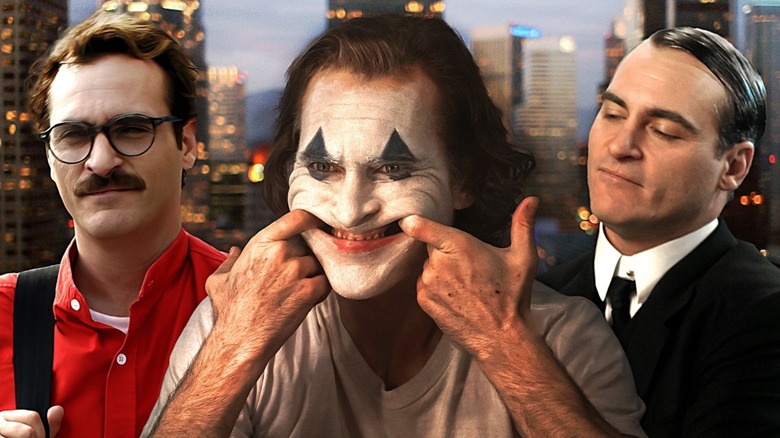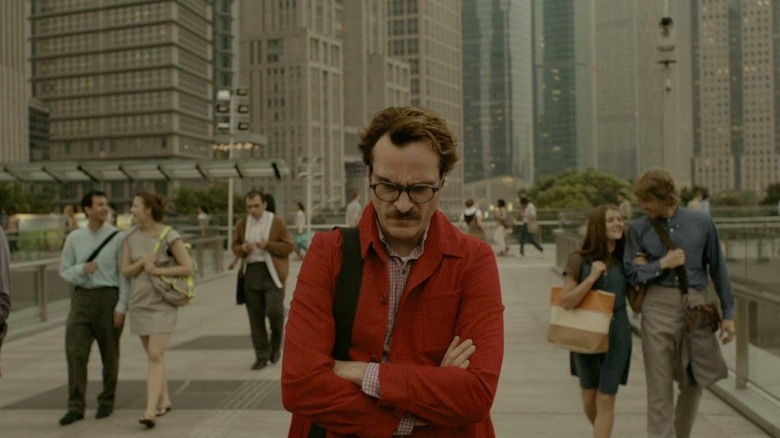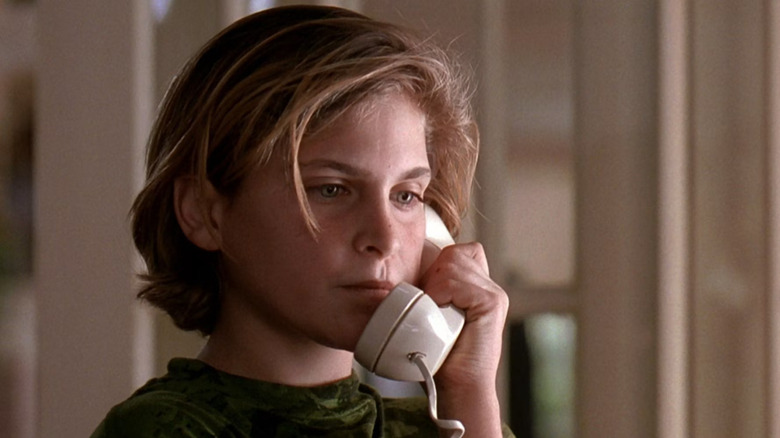Joaquin Phoenix’s Best Movie According To Rotten Tomatoes
Joaquin Phoenix made his professional acting debut in the 1985 TV movie “Kids Don’t Tell,” a heady primetime drama about child victims of sexual assault. Phoenix was only 11 at the time. The following year, Phoenix first appeared in theaters in the kid-friendly drama “SpaceCamp,” about teenagers and children who are accidentally launched into space. Phoenix continued to land high-profile roles with interesting directors, appearing in Ron Howard’s “Parenthood” in 1989 and Gun Van Sant’s “To Die For” in 1995. Phoenix soon became an indie darling, and a go-to actor for extreme, quirky, sometimes dark roles. He played a kooky thug in Oliver Stone’s “U Turn,” and a wise pornographer in Joel Schumacher’s “8mm.”
By the time he appeared in Ridley Scott’s “Gladiator” in 2000, Phoenix was a household name. The role earned him the first of four (to date) Academy Award nominations. He would also be nominated for playing Johnny Cash in the biopic “Walk the Line,” and for playing a total lunatic in Paul Thomas Anderson’s “The Master.” He also played the lead character in Anderson’s whimsical stoner noir “Inherent Vice.” Phoenix won his first Oscar in 2019 for playing the title villain in Todd Phillips’ overwhelmingly successful “Joker.” Most recently, Phoenix played the title character in the panic-attack movie “Beau is Afraid,” the title character in Scott’s “Napoleon,” and will soon reprise the Joker in “Joker: Folie à Deux,” due in theaters on October 4.
Whether or not one always loves Phoenix’s movies, one cannot deny that he makes interesting choices. He tends to work with unique filmmakers and likes to swing for the walls while performing. He knows how he is perceived, and the actor once tried to satirically “reinvent” himself as a rapper (?) in a bizarre public persona experiment, detailed in the mockumentary “I’m Still Here.” Phoenix is an odd man.
None of the above films, however, received better notices than his 2013 sci-fi film “Her,” directed by Spike Jonze. That film has a 95% approval rating on Rotten Tomatoes, based on 296 reviews.
Her
“Her” may be pretty well-known to a mass audience. It was nominated for five Academy Awards the year it came out, for Best Picture, Best Screenplay, Best Score, Best Song, and Best Production Design. “Her” is set in a near future where everything is just a little slicker and cities are noticeably more crowded. Phoenix plays a lonely man named Theodore on the cusp of divorce, working for a company that employs professional writers to write letters for those unable to express themselves. The world seems to be suffering from an emotional blockage and everyone is isolated, despite the crowds. To help him with everyday tasks, Theodore hires an artificially intelligent smartphone assistant named Samantha (Scarlett Johansson) who only exists as a voice. Samantha, while only part of his smartphone, seems weirdly savvy to his needs, and, before long, begins expressing real emotions.
Samantha encourages Theodore to date and be happy, although he soon realizes that he and Samantha may be having emotional and sexual feelings for one another. Before long, Theodore begins announcing that Samantha is his girlfriend. In this world, this seems to be common, as others have made similar claims about their smartphones. Some romantic tension arises when Theodore realizes that Samantha is becoming a massive non-corporeal computer presence on Earth, and is taking care of hundreds of others. Can Theodore live with his girlfriend seeing other people?
“Her” was overwhelmingly praised by critics, with many calling it the best film of the year (including A.A. Dowd, Drew McWeeny, Scott Foundas, and David Eledstein). Only a few critics gave “Her” wholly negative reviews, with some saying that it didn’t pursue its sci-fi angles nearly enough, and others feeling the emotional stakes weren’t high enough.
Some noted that “Her” examines the nature of love, and the male tendency to objectify their female lovers, even while feeling genuine affection for them. Others liked the sci-fi elements, praising a predictive narrative about our evolving relationships with our personal devices. Now that A.I. girlfriends are a thing, “Her” is looking truer every day.
Phoenix’s other hits
Joaquin Phoenix’s other best-reviewed films include the recent coming-of-age drama “C’mon C’mon,” sporting a 94% approval rating, and the supremely uncomfortable suburban nightmare “Parenthood,” which Phoenix made while still in junior high school. He also played a supporting role in the intense “Hotel Rwanda” (91%), and gave what might be his best performance in Lynne Ramsay’s bleak assassin drama “You Were Never Really Here” (89%).
Many find “Gladiator” to be exciting, but critical approval topped out at 80%. Looking back, it’s a largely mediocre film, even if Phoenix got to chew up some scenery.
Not all of Phoenix’s films were beloved, and indeed, he has performed in some downright turkeys in his day. Schumacher’s “8mm” was too bleak and melodramatic for many critics, leaving its approval rating at a harsh 23%. No one seemed to like his turn in the Disney animated film “Brother Bear” (37%), and only a few more critics felt the need to praise “Mary Magdalene” (44%) the film in which Phoenix played Jesus Christ (!). Although Phoenix and M. Night Shyamalan worked well together in “Signs,” fewer like their collaboration in “The Village” (57%), and for however bold an experiment “I’m Still Here” may have been, many felt the experiment was a failure. It has a 52% approval rating.
Whatever Phoenix chooses to do next, one can rest assured that it will be strange, challenging, and out on the edge. The world can use more strange, daring actors like Phoenix.

















Post Comment